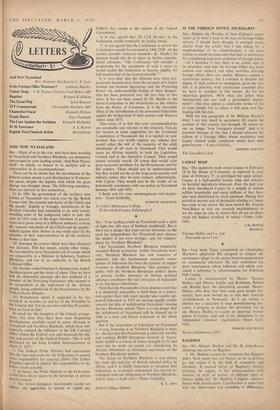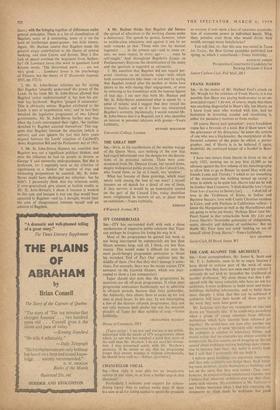BAGEHOT
SIR,—Mr. Alastair Buchan and Mr. St. John-Stevas challenge my views on Bagehot.
1. Mr. Buchan accepts my statement that Bagehot didn't 'have much time for theory' as far as politics go, but rejects it in the field of economics and literature. A marked defect of Bagehot's literary criticism, he argues, is his 'preoccupation with theories, of style, of motive, of different types of literary mind, etc.' Mr. Buchan, I Suggest, confuses theory with classification. Classification is concerned with the observation and recording of differences,
theory with the bringing together of differences under general principles. There is a lot of classification of Bagehot, some of it interesting, some of it on the level of intellectual paper-games: but little theory. Again, Mr. Buchan asserts that Bagehot made the greatest single contribution to the theory of central banking, and cites Cairns and Jevons. May 1 (for lack of space) continue the Argument from Author- ity? Of Lombard Street (the work in question) Lord Keynes wrote, 'The theoretical parts . . . are not very good, . . . Lombard Street is the psychology of Finance, not the theory of it' (Economic Journal, 1915, pp. 372-3).
2. Mr. St. John-Stevas criticises me for saying that Bagehot 'absurdly underrated' the power of the Lords. In his book Mr. St. John-Stevas allowed that Bagehot 'rather underestimated' it, but now his atti- tude has hardened : Bagehot 'gauged it accurately.' This is obviously untrue. Bagehot attributed to the Lords 'a sort of hypothetical veto,' and in fact they wrecked the legislative programme of two Liberal governments. Mr. St. John-Stevas further says that when the Lords overstepped their rights, 'the realities sketched by Bagehot asserted themselves.' This sug- gests that Bagehot foresaw the situation (which is untrue), and also ignores the fact that forty years elapsed between the Lords' rejection of Cardwell's Army Regulation Bill and the Parliament Act of 1911.
3. Mr. St. John-Stevas disputes my assertion that Bagehot was not a significant political thinker, and cites the influence he had on people as diverse as George V and university undergraduates. But this is irrelevant, for I expressly took as my criterion of significance in a thinker the number of true and interesting propositions he asserted. Mr. St. John- Stevas might have challenged my criterion : but he didn't. I personally think that my criterion could, if over-generalised, give almost as foolish results as Mr. St. John-Stevas's. I chose it because it worked in this case and because it was one that would have appealed to Bagehot—and so, I thought, would limit the area of disagreement between myself and an admirer of Bagehot.
4. Mr. Buchan thinks that Bagehot did foresee the spread of education to the working classes under a democracy. The speech he quotes, however, refers to middle-class education, and against it can be set such remarks as that 'Those who live by manual ingenuity . . . in the present age—and to some ex- tent, we must expect, in every age— . . . must be ,self-taught.' And throughout Bagehot's Essays on Parliamentary Reforms the identification of the many and the ignorant is regarded as axiomatic.
5. My assertion that Bagehot did not regard per- sonal relations as an ultimate value—with which both correspondents.take issue—is not met by saying that Bagehot looked after his mother or wrote love letters to his wife during their engagement, of even by referring to his friendships with the famous figures of that day. I am sure that both Mr. Buchan and Mr. St. John-Stevas understand what is meant by 'a sense of values,' and I suggest that they reread the Literary Studies and see if I have not interpreted Bagehot's correctly. Incidentally, I would remind Mr. St. John-Stevas that it is Bagehot, not I, who identifies an interest in personal relations with gossip.—Yours faithfully,
RICHARD WOLLHEIM



































 Previous page
Previous page